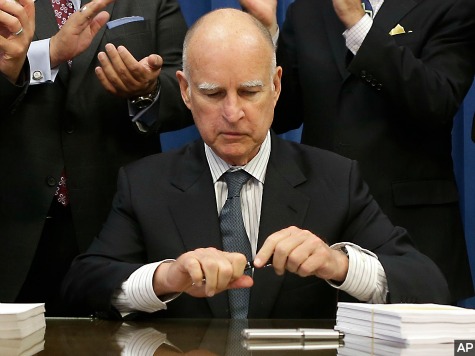The Los Angeles Times reports that California Governor Jerry Brown, claiming he is concerned about the cost of a supplemental pamphlet on the November ballot, decided against signing an advisory measure that requests Congress to amend the U.S. Constitution and overturn the Citizens United court decision. But Brown also didn’t torpedo the measure; the advisory question, Proposition 49, will still be included in the principal ballot pamphlet, even without Brown’s signature.
Brown has been outspoken in his denunciation of Citizens United, writing the California legislature that the decision that jettisoned campaign contribution limits for corporations was “wrongly decided and grossly underestimated the corrupting influence of unchecked money on our democratic institutions.”
But Brown added that he would not sign the advisory measure for fear of misleading voters: “But we should not make it a habit to clutter our ballots with nonbinding measures, as citizens rightfully assume that their votes are meant to have legal effect.” He concluded that the ballot measure “has no legal effect whatsoever,” and pointed out that the legislature already approved a resolution, SB 1272, the Overturn Citizens United Act, that requested Congress to convene a constitutional convention in order to pass an amendment reversing Citizens United.
Brown, straddling the fence, asserted in the statement to the legislature that he wanted voters to voice their opinions – but he also didn’t: “Nevertheless, given the Legislature’s commitment on this issue, even to the point of calling for an unprecedented Article V constitutional convention, I am willing to allow this question to be placed before the voters. By allowing SB 1272 to become law without my signature, it is my intention to signal that I am not inclined to repeat this practice of seeking advisory opinions from the voters.”
Larry Gerston, a political science professor at San Jose State University, explained that even if there were a Constitutional Convention, the amendment to reverse Citizens United would likely fail, because it would require a two-thirds vote in each house to take action. He noted, “Given the polarization on nonpolitical issues, there will be nowhere (near) two-thirds majorities in either chamber.”
State Sen. Ted Lieu (D-Torrance), the co-author of SB 1272, praised Brown for not scuttling the advisory measure. He said, “My measure will give voice to California’s electorate about the influence of money in politics and drive a national debate on campaign-finance reform.”
SB 1272 states:
This bill would call a special election to be consolidated with the November 4, 2014, statewide general election. The bill would require the Secretary of State to submit to the voters at the November 4, 2014, consolidated election an advisory question asking whether the Congress of the United States should propose, and the California Legislature should ratify, an amendment or amendments to the United States Constitution to overturn Citizens United v. Federal Election Commission (2010) 558 U.S. 310, and other applicable judicial precedents, as specified.

COMMENTS
Please let us know if you're having issues with commenting.